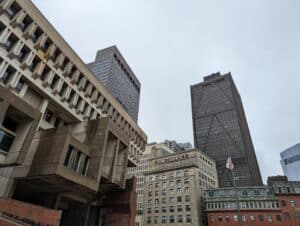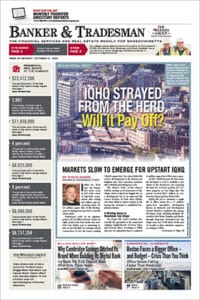
Boston City Hall and downtown Boston office buildings seen from City Hall Plaza. Photo by James Sanna | Banker & Tradesman Staff / file
A compromise between Boston business groups and Mayor Michelle Wu over a shift in Boston’s property tax structure remains elusive as the deadline to set tax rates for 2025 approaches.
On Friday, a business coalition including commercial real estate developers group NAIOP Massachusetts renewed its call for Wu to reduce spending rather than placing a larger share of the city’s tax levy on commercial properties. In a letter to Senate President Karen Spilka and House Speaker Ronald Mariano, it called for a smaller proposed increase in the tax rate increase proposed for commercial properties.
A Spilka spokesperson told the Boston Globe on Sunday that “it will be difficult to get a final bill through the Senate without the full support of the business community.”
But NAIOP CEO Tamara Small today said Wu responded over the weekend by rejecting the group’s proposal, which would have increased the maximum property tax rate shift from 175 to 181.5 percent in fiscal 2025 and returning to the current 175 percent level in fiscal 2028.
“She responded and said she did not want to accept that and wanted to go higher,” Small said. “We made it clear that was our best and final offer.”
Wu offered a counterproposal that would have included an average annual residential tax increase of 8.5 percent, compared with an estimated 9 percent cited in the business group proposal.
A Wu spokesperson said the mayor’s latest proposal was submitted before seeing the business group’s proposal.
The Legislature’s approval is needed for Boston to increase the differential in commercial and residential tax rates beyond the maximum allowed under state law.
NAIOP Massachusetts, the Greater Boston Chamber of Commerce, the Massachusetts Taxpayers Foundation and Boston Municipal Research Bureau submitted the proposal for the smaller tax shift.
In remarks to reporters at a ribbon-cutting ceremony on Thursday, Wu defended the original proposal, which was supported 8-4 by the City Council in June.
“Some people might say compromise means not doing this proposal at all and instead cutting our budget. To me, that is not a compromise,” Wu said. “That is abandoning the idea that we know and the tools that we need.”
Wu has framed the issue as an attempt to protect services and cushion residential homeowners from a steep increase in their tax bills beginning in January, by increasing rates on the commercial sector. The Home Rule petition gives Boston the power to temporarily shift a larger portion of the tax levy to commercial real estate for three years.
Business groups say the additional taxes will burden commercial landlords and tenants and hinder downtown revitalization efforts. They argued for a fiscal 2025 budget increase of 3 to 4 percent, compared with the current 8 percent increase.
The compromise submitted Friday would result in a residential tax increase of 9 percent, according to the group’s letter.
“To do anything beyond that would not be supported by business groups, and we encourage the mayor to accept this very fair offer and to file a new home rule petition,” Small said.
Legislative approval is needed before December for the Boston City Council to set tax rates for the 2025 calendar year, administration officials said this month.
Editor’s note: This report has been updated with a comment from the mayor’s office on the timing of the latest proposal.








